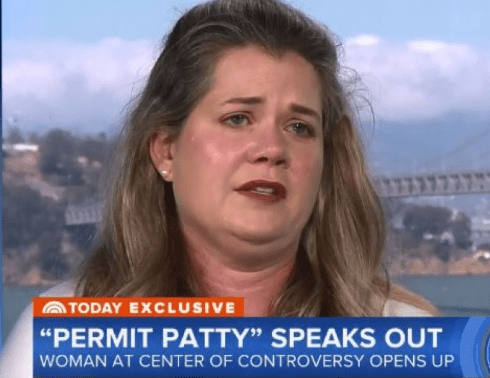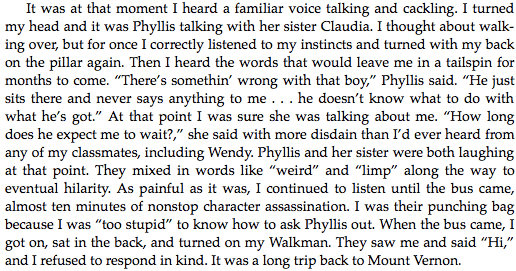Tags
Academia, Allison Ettel, Black Feminism, Brittney Cooper, Caitriona Balfe, Claire, Crocodile Tears, Femininity, Feminism, Hypermasculinity, Kyle Stephens, Legitimate Tears, Lifetime, Misogyny, Outlander, Pitt, Racism, Ruby Hamad, Sexism, Shay Stewart Bouley, Wet Rags, White Women's Tears, White-Girl Tears, Workplace Issues

The tears of Allison Ettel, a.k.a., #PermitPatty, NBC’s The Today Show (cropped), June 26, 2018. (http://bet.com).
I’ve been thinking about this post for a while, probably for at least two years. But it does help when others closer to the subject write about it as well. Between @ProfessorCrunk Brittney Cooper’s chapter “White-Girl Tears” in her hard-hitting Black feminist primer Eloquent Rage (2018), @blackgirlinmain Shay Stewart Bouley’s recent blog post “Weapon of lass destruction: The tears of a white woman,” and Ruby Hamad’s piece in The Guardian, “How white women use strategic tears to silence women of colour,” what can I really add? (Everyone who believes in feminism and wants to support women of color writers ought to read these essays, by the way). Oh, just the idea that men of color deal with White women’s/girl’s tears as well. And that some of us have been just anti-sexist enough to recognize how our Whiteness and patriarchal-dominated society privileges and legitimizes such tears, often to our detriment.
Over the years, I’ve taken to calling those who cry over the least amount of adversity and stress wet rags, and those instances in which sobbing becomes a central theme “wet-rag episodes.” This started for me in the late-1990s, when my then girlfriend (now wife of eighteen years) would spent upwards of 12 hours of her Saturdays watching Lifetime movies (some of which were originally NBC, ABC, or CBS specials, before the dominant return of reality TV in the double aughts). At first, I did a play on Lifetime‘s slogan back then, “Lifetime: Television for Women,” adding, “not for men” whenever the tag line appeared during commercials.
But Lifetime is an addiction, if you sit there long enough watching the ups and downs of romances, the constant threat of stalkers, date rape, teenage pregnancy, and drugs, and the upbeat endings and vindication at the end of every two-hour movie. What I noticed most of all, though, were the waterworks. Everyone from Lynda Carter to Lindsay Wagner, from Elizabeth Montgomery to Jaclyn Smith could cry at the sound of a book drop!

Cartoon character from Fairly Odd Parents crying an ocean of tears (cropped), June 30, 2018. (http://fairlyoddfanon.wikia.com).
Admittedly, I cry very easily while watching emotional and gut-wrenching scenes. I cried when I saw Viola Davis take on Denzel Washington’s character in Fences (2016) over his years of cheating and his secret family. Especially when Davis blew a snot bubble in the middle of the scene. I was through for the next three minutes!
With Lifetime movies, though, I stopped crying for these White women over the twists and turns in their lives. I watched one scene in one movie where the main character broke out and cried at her dining room table in her laid-out, five-bedroom home when she realized she only had $10,000 left in her bank account. I didn’t just laugh. I howled. As someone for whom poverty and financial struggles have been a constant companion, having that much money in any account at any time has always been a time of celebration. “You shouldn’t laugh. Poverty is relative,” Angelia said while also laughing. “No, it isn’t. She’s a wet rag!” I responded. I’ve spent a good portion of my career proving this point, too.
That scene took me back to so many wet-rag episodes in my life. Like when my high school valedictorian classmate cried angry tears over a 67 on an English essay exam our junior year, losing 25 points because she didn’t underline James Baldwin’s book title Notes from a Native Son in her essay. I didn’t feel sorry for her, Ms. 5.45 GPA, not one bit (it’s all in Boy @ The Window).
Or, during my second year in grad school at Pitt, when a student in one of my US History to 1877 sections tried to proposition me to raise her C- average. When that didn’t work, a fountain of tears poured out. I handed her a tissue, but said, “Your tears in no way are a substitute for studying and working harder in this class.” She didn’t exactly give me 5’s on her evaluations of me in the course at the end of that semester.
Ten years later, I had White women as co-workers and students who could cry about almost anything. My one-time boss Ken blamed me for making a former co-worker cry because I refused to take her “I hope you had a wonderful vacation!” the week after 9/11 in stride. Yeah, sure. It was a week in which I was stuck in Atlanta for four days after a one-day work trip and had to take Greyhound for 15 hours back to DC, not knowing if my older brother was dead or alive. I said as much to my co-worker, and she ran away from me crying.
A student in my History of American Education Reform graduate course cried when I refused to change her grade from an A- to an A. I was in the middle of explaining how she could revise her research paper and still end up with an A. It was just before Thanksgiving, and until that moment, I had thought that this was one of the best courses I’d ever taught, with one of the best group of students I had had in one of my courses. Her sudden sobbing actually pissed me off. I tried not to show it. But I did say, “What are you crying about? There’s nothing about your standing in this course for you to be crying about.” I said it in a tone that I’d only find again once my son became a preteen.

Caitriona Balfe as Claire wailing over the loss of Jamie and the Battle of Culloden, July 9, 2016. (http://www.bookbub.com).
It’s to the point now that I don’t even watch wet-rag shows anymore, at least once the character becomes one. For example, I watched the split first season of Starz’s Outlander with Caitriona Balfe as Claire, and found it mostly enjoyable. Until she began turning on the waterworks in practically every episode. My wife continues to watch, but laughs every time I ask, “What happened on Wet Rag this week?”
I know that White women and White girls, like all human beings, have plenty good reason to cry. Every time I saw video of Kyle Stephens‘ sentencing-phase testimony about what convicted rapist and felon Larry Nassar starting doing to her when she was five years old, I cried for her and with her. Trauma and tragedy are good reasons to cry, wail, sob, and weep. But, so many wet-rag tears are drop-of-the-hat, crocodile tears. About getting caught in lies, about making racist and anti-poverty and anti-women-of-color statements that don’t go over well, about anything that would otherwise paint them as narcissistic and not-so-smart brats.
While I know I don’t have as difficult a row to hoe as so many women of color in the public sphere, one thing I know I’m not allowed to do in a hyper-masculine world of Whiteness and patriarchy is cry. I got hit with the f-bomb so many times growing up, from Black boys, Black men, and Black women, and faced threats of violence as a result. I would’ve been recommended for psychotherapy if I had ever cried over an A-, and been laughed at for complaining about my workplace conditions. Women of color can lose careers over their tears. Black boys and men have lost their freedom and lives over them. One isn’t less damaged over the delegitimization of our tears, but the damage can be differential, depending on gender, class, sexual orientation, and the level of toxic hyper-masculinity surrounding you.
That is why I can’t stand wet rags. Their tears fill the world with concern and fear, and marginalize and dehumanize the rest of us. I have no sympathy for crocodile tears. I don’t know if I’ve ever had sympathy for them.















